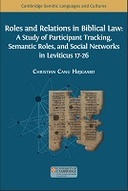Explore

Roles and Relations in Biblical Law
0 Ungluers have
Faved this Work
Login to Fave
Leviticus 17–26, an ancient law text known as the Holiness Code, prescribes how particular persons are to behave in concrete, everyday situations. The addressees of the law text must revere their parents, respect the elderly, fear God, take care of their fellow, provide for the sojourner, and so on. The sojourner has his own obligations, as do the priests. Even God is said to behave in various ways towards various persons. Thus, the law text forms an intricate web of persons and interactions. There is a growing awareness that ancient law texts were not arbitrary collections of legal paragraphs but articulations of certain world views. The laws were rational in their own respect and were based on the lawgiver’s ethos. However, since the ethical values of the lawgiver rarely—if ever—surface in the text itself, it has proven difficult to grasp with traditional, exegetical methods. This study offers a novel approach to mapping out the ethos of an ancient law text like Leviticus 17–26. By employing social network analysis, the participants and their interactions are mapped to scrutinize the ethical roles embodied by the persons of the law. To accomplish this, the study undertakes meticulous research into both the participants and the interactions of Leviticus 17–26. The book investigates a semi-automatic approach to extracting participant information from a text and offers new methods for analysing Hebrew interactions (realised as verbal predicates) in terms of dynamicity, causation, and agency.
This book is included in DOAB.
Why read this book? Have your say.
You must be logged in to comment.
Rights Information
Are you the author or publisher of this work? If so, you can claim it as yours by registering as an Unglue.it rights holder.Downloads
This work has been downloaded 39 times via unglue.it ebook links.
- 39 - pdf (CC BY-NC) at Unglue.it.
Keywords
- Ethical roles
- Hebrew textual interactions
- Holiness Code
- Law text
- Leviticus 17–26
- Social network analysis
- thema EDItEUR::J Society and Social Sciences::JB Society and culture: general::JBS Social groups, communities and identities::JBSR Social groups: religious groups and communities
- thema EDItEUR::Q Philosophy and Religion::QR Religion and beliefs::QRA Religion: general::QRAC Comparative religion
- thema EDItEUR::Q Philosophy and Religion::QR Religion and beliefs::QRA Religion: general::QRAM Religious issues and debates::QRAM1 Religious ethics
- thema EDItEUR::Q Philosophy and Religion::QR Religion and beliefs::QRA Religion: general::QRAX History of religion
Links
DOI: 10.11647/OBP.0376Editions

